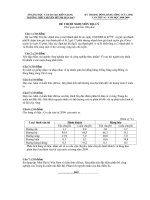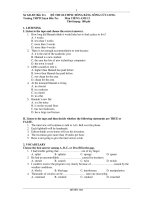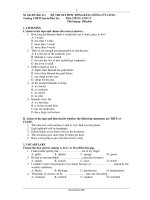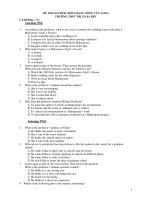ĐỀ THI OLYMPIC ĐỒNG BẰNG SÔNG CỬU LONG - THPT Chuyên Bến Tre pptx
Bạn đang xem bản rút gọn của tài liệu. Xem và tải ngay bản đầy đủ của tài liệu tại đây (160.04 KB, 8 trang )
1
ĐỀ BẾN TRE
Sở GD-ĐT Bến Tre ĐỀ THI OLYMPIC ĐỒNG BẰNG SÔNG CỬU LONG
Trường THPTChuyn Bến Tre Mơn TIẾNG ANH 12
Thời lượng: 180 pht
1. LISTENING
I. Listen to the tape and choose the correct answers.
1. How long did Hannah think it would take her to find a place to live?
A. 3 weeks
B. less than 3 weeks
C. more than 3 weeks
D. more than 4 weeks
2. There is not enough accommodation to rent because
A. it is the end of the academic year
B. Hannah is a new student
C. the area has lots of new technology companies
D. the town is small
3. £400 a month to rent is
A. higher than Hannah has paid before
B. lower than Hannah has paid before
C. not cheap for the area
D. cheap for the area
4. At the moment Hannah is living
A. in a hostel
B. in a suitcase
C. in a hotel
D. in a flat
5. Hannah’s new flat
A. is a bit noisy
B. is on the second floor
C. has two bedrooms
D. has a large roof terrace
II. Listen to the tape and then decide whether the following statements are TRUE or
FALSE.
1. The interview will continue to talk to A.G. Bell over the phone.
2. Each lightbulb will be handmade.
3. Edison thinks every home will use his invention.
4. The invention goes more than 18 miles per hour.
5. Benz is not going to give the interviewer a ride.
2. VOCABULARY
Choose the best answer among A, B, C, or D to fill in the gap.
1. I had trouble getting that …………………… out of my finger.
A. splint B. splinter C. sponge D. spasm
2. He had an uncontrollable …………………… caused by tiredness.
A. stretch B. scratch C. twist D. twitch
3. I couldn’t receive the program very clearly because of …………………… caused by the
weather conditions.
A. blocks B. blockage C. interference D. manipulation
4. Thousands of circuits can be …………………… onto one microchip.
A. crammed B. crushed C. cranked D. crunched
2
ĐỀ BẾN TRE
5. Nowadays international telephone calls are beamed into space and ……………………
off satellites.
A. bumped C. bounced jumped D. radiated
6. If there’s no coffee left, we’ll have to …………………… tea.
A. do up with B. make do with C. do away with D. make up with
7. Teetotalers …………………… from drinking alcohol.
A. avert B. abstain C. evade D. abscond
8. Dieticians have recently …………………… suggestions for a complete reform in our
eating habits.
A. come up to B. put forward C. made up D. taken out
9. The …………………… against the baby being deformed are about 1,000 in 1.
A. possibilities B. figures C. opportunities D. odds
10. Unless you give up smoking, you …………………… the risk of damaging your health.
A. bear B. suffer C. made D. run
3. GRAMMAR
I. Choose the appropriate tense or form of verb to fill in the gap.
Farmers, as we all know, (1) ……………… a hard time of it in Britain lately, and are
turning to new ways of earning income from their land. This involves not only (2)
……………… new kinds of crops, but some strange ways of making money, the most unusual
of which has got to be sheep racing. Yes, you did hear me correctly! A farmer in the West of
England now (3) ……………… sheep races on a regular basis, and during the past years over
100,000 people have turned up to watch the proceedings. ‘I (4) ……………… the farm on my
way to the sea for a holiday,’ one punter told me, ‘and I thought I’d have a look. I didn’t believe
it was serious, to tell you the truth.’ According to a regular visitor, betting on sheep is more
interesting than betting on horses. ‘At proper horse races everyone has already studied the form
of the horses in advance, and there are clear favorites. But nobody (5) ……………… anything
about these sheep! Most people find it difficult to tell one from another in any case. I stayed (6)
……………… the races, and I must admit that I (7) ……………… it quite exciting. In a
typical race, half a dozen sheep (8) ……………… downhill over a course of about half a mile.
Food (9) ……………… for them at the other end of the track, I ought to add! The sheep run
surprisingly fast, although presumably they haven’t eaten for a while just to give them some
motivation. At any rate, the crowd around me (10. obviously) ……………… their day out at
the races, judging by their happy faces and the sense of excitement.
1. A. have B. are having C. have been having D. was having
2. A. plant B. planting C. to plant D. having planted
3. A. holds B. is holding C. held D. has been held
4. A. pass B. have passed C. am passing D. was passing
5. A. hear B. heard C. has heard D. have heard
6. A. watching B. to watch C. watch D. having watched
7. A. find B. am finding C. found D. was finding
8. A. race B. have raced C. are racing D. had raced
9. A. waits B. has waited C. is waiting D. was waiting
10. A. …enjoy B. …enjoyed C. are…enjoying D. were…enjoying
II. Choose the correct preposition or adverbial particle to fill in the gap.
1. Sheila was right, so Paul had to back ………………
A. out B. off C. down D. out of
2. We are having our living room done ………………
A. up B. down C. away D. with
3. None of the children would own ……………… to breaking the window.
A. against B. up B. out D. off
3
ĐỀ BẾN TRE
4. I don’t believe you. You’re having me ………………
A. up B. on C. in D. off
5. It seems to be your boss who is ……………… fault in this case.
A. at B. under C. with D. for
6. Tina is an authority ……………… Byzantine architecture.
A. for B. on C. with D. in
7. Many people in the neighborhood like to visit the elderly woman because of her great
sympathy and concern ……………… others.
A. about B. of C. for D. to
8. Because of an attack by a bear ……………… campers, the area was declared a danger
zone and visitors were denied access to it.
A. to B. toward C. in D. on
9. He could not be heard ……………… the tumult of angry voices.
A. from B. about C. of D. over
10. The VCR came with a 12-month guarantee ……………… all parts and service.
A. on B. by C. with D. for
III. Choose the underlined part that you think must be changed to make the sentence
correct.
1. Valedictorian of his Rutgers class, an Olympic gold medalist, and an internationally
A B
renowned singer, Paul Robeson was a man of diverse ability.
C D
2. We chose to take a trip to the Far East because it was advertised as adventurous and
A B C
intrigued.
D
3. Luther Burbank was a pioneer in the process of graftingly immature plants onto fully
A B C D
mature plants.
4. Woody Guthrie wrote thousands of songs during the lifetime, many of which became
A B C
classic folk songs.
D
5. When the female oriole is absent from the nest, the male oriole serves like a sentinel.
A B C D
6. A microchip, or integrate circuit, is an electric component containing many tiny
A B
circuits that can process or store electric signals.
C D
7. Many people say that California is a state of geographically remarkable diversity.
A B C D
8. Wind is the motion that occurs when lighter air rises and cools heavier air replaces it.
A B C D
9. Almost poetry is more enjoyable when it is read aloud.
A B C D
10. In the human body, blood flows from a heart through the arteries, and it returns
A B C D
through the veins.
4. READING
I. Read the passage and then choose the best answers.
4
ĐỀ BẾN TRE
ARTISANS AND INDUSTRIALIZATION
Before 1815 manufacturing in the United States had been done in homes or shops by skilled
artisans. As master craftworkers, they imparted the knowledge of their trades to apprentices and
journeymen. In addition, women often worked in their homes part-time; making finished articles
from raw material supplied by merchant capitalists. After 1815 this older form of manufacturing
began to give way to factories with machinery tended by unskilled or semiskilled laborers.
Cheap transportation networks, the rise of cities, and the availability of capital and credit all
stimulated the shift to factory production.
The creation of a labor force that was accustomed to working in factories did not occur
easily. Before the rise of the factory, artisans had worked within the home. Apprentices were
considered part of the family, and masters were responsible not only for teaching their
apprentices a trade but also for providing them some education and for supervising their moral
behavior. Journeymen knew that if they perfected their skill, they could become respected master
artisans with their own shops. Also, skilled artisans did not work by the clock, at a steady pace,
but rather in bursts of intense labor alternating with more leisurely time.
The factory changed that. Goods produced by factories were not as finished or elegant as
those done by hand, and pride in craftsmanship gave way to the pressure to increase rates of pro-
ductivity. The new methods of doing business involved a new and stricter sense of time. Factory
life necessitated a more regimented schedule, where work began at the sound of a bell and
workers kept machines going at a constant pace. At the same time, workers were required to
discard old habits, for industrialism demanded a worker who was alert, dependable, and self-
disciplined. Absenteeism and lateness hurt productivity and, since work was specialized,
disrupted the regular factory routine. Industrialization not only produced a fundamental change
in the way work was organized; it transformed the very nature of work.
The first generation to experience these changes did not adopt the new attitudes easily. The
factory clock became the symbol of the new work rules. One mill worker who finally quit
complained revealingly about "obedience to the ding-dong of the bell-just as though we are so
many living machines." With the loss of personal freedom also came the loss of standing in the
community. Unlike artisan workshops in which apprentices worked closely with the masters
supervising them, factories sharply separated workers from management. Few workers rose
through the ranks to supervisory positions, and even fewer could achieve the artisan's dream of
setting up one's own business. Even well-paid workers sensed their decline in status.
In this newly emerging economic order, workers sometimes organized to protect their rights
and traditional ways of life. Craftworkers such as carpenters, printers, and tailors formed unions,
and in 1834 individual unions came together in the National Trades' Union. The labor movement
gathered some momentum in the decade before the Panic of 1837, but in the depression that fol-
lowed, labor's strength collapsed. During hard times, few workers were willing to strike or
engage in collective action. And skilled craftworkers, who spearheaded the union movement, did
not feel a particularly strong bond with semiskilled factory workers and unskilled laborers. More
than a decade of agitation did finally bring a workday shortened to 10 hours to most industries by
the 1850's, and the courts also recognized workers' right to strike, but these gains had little
immediate impact.
Workers were united in resenting the industrial system and their loss of status, but they
were divided by ethnic and racial antagonisms, gender, conflicting religious perspectives,
occupational differences, political party loyalties, and disagreements over tactics. For them, the
factory and industrialism were not agents of opportunity but reminders of their loss of
independence and a measure of control over their lives. As United States society became more
specialized and differentiated, greater extremes of wealth began to appear. And as the new
markets created fortunes for the few, the factory system lowered the wages of workers by
dividing labor into smaller, less skilled tasks.
1. Which of the following can be inferred from the passage about articles manufactured
before 1815?
A. They were primarily produced by women.
B. They were generally produced in shops rather than in homes.
C. They were produced with more concern for quality than for speed of production.
D. They were produced mostly in large cities with extensive transportation networks.
5
ĐỀ BẾN TRE
2. Which of the sentences below best expresses the essential information in the highlighted
sentence in the passage? Incorrect answer choices change the meaning in important
ways or leave out essential information.
A. Masters demanded moral behavior from apprentices but often treated them
irresponsibly.
B. The responsibilities of the master to the apprentice went beyond the teaching of a
trade.
C. Masters preferred to maintain the trade within the family by supervising and
educating the younger family members.
D. Masters who trained members of their own family as apprentices demanded
excellence from them.
3. In paragraph 4, the author includes the quotation from a mill worker in order to
A. support the idea that it was difficult for workers to adjust to working in factories.
B. to show that workers sometimes quit because of the loud noise made by factory
machinery.
C. argue that clocks did not have a useful function in factories.
D. emphasize that factories were most successful when workers revealed their
complaints.
4. Which of the following statements about the labor movement of the 1800's is supported
by paragraph 5?
A. It was most successful during times of economic crisis.
B. Its primary purpose was to benefit unskilled laborers.
C. It was slow to improve conditions for workers.
D. It helped workers of all skill levels form a strong bond with each other.
5. The author identifies political party loyalties, and disagreements over tactics as two of
several factors that
A. encouraged workers to demand higher wages.
B. a created divisions among workers.
C. caused work to become more specialized.
D. increased workers' resentment of the industrial system.
II. Read the passage carefully, and then decide whether the statements below are TRUE
or FALSE.
The music that makes the foot tap, the fingers snap, and the pulse quicken stirs the brain at its
most fundamental levels, suggesting that scientists one day may be able to retune damaged
minds by exploiting rhythm, harmony, and melody, according to new research,
"Undeniably, there is a biology of music," said Harvard University Medical School
neurobiologist Mark Jude Tramo. "Music is biologically part of human life, just as music is
aesthetically part of human life."
Researchers found that the brain:
Responds directly to harmony. Neuroscientists discovered that different parts of the brain
involved in emotion are activated depending on whether the music is pleasant or unpleasant.
Interprets written music in an area on the brain's right side. That region corresponds to an
area on the opposite side of the brain known to handle written words and letters. So,
researchers uncovered an anatomical link between music and language.
Grows in response to musical training. In a study of classically trained musicians, researchers
discovered that male musicians have significantly larger brains than men who have not had
extensive musical training.
Overall, music seems to involve the brain at almost every level, and researchers are already
looking for ways to harness the power of music to change the brain. Preliminary research also
suggests that music may play some role in enhancing intelligence. Indeed, so seductive is the
possibility that music can boost a child's IQ that some politicians are lobbying for schoolchildren
to be exposed regularly to Mozart sonatas, although such research has yet to be confirmed.
The scientists said the new research could help the clinical practice of neurology, including
cognitive rehabilitation. As a therapeutic tool for example, some doctors already use music to
help rehabilitate stroke patients. Surprisingly, some stroke patients who have lost their ability to
6
ĐỀ BẾN TRE
speak retain their ability to sing, and that opens an avenue for therapists to retrain the brain's
speech centers.
1. Different areas of the brain respond to music.
2. The brains of classically trained male musicians grow larger than the brains of
nonmusician males.
3. The brains of classically trained female musicians do not grow larger than nonmusician
females.
4. Children who listen to Mozart sonatas develop higher intelligence than those who do not
have exposure to this music.
5. Some stroke victims who are unable to speak are able to sing.
III. Read the text below and decide which answer A, B, C, or D best fits each space.
HOME-ALONE FATHERS
The number of (1)……………………… fathers has increased considerably in recent years in
Britain. We spoke to one such dad, Steve Baker, about how he (2) ……………………… it all.
Steve, 43, has brought up his two teenage sons since he and his wife (3) ………………………
up two years ago. “It’s (4) ………………………more difficult for a man than it is for a
woman,” says Steve. “It’s a full-time job, whoever you are. Fortunately for me, my employers
were very sympathetic in the first new months and they (5) ……………………… me take time
off work to get myself organized.
As far as the housework is concerned, I don’t mind cooking, as I’ve always been good at
that; it’s the ironing I can’t (6) ………………………! Generally speaking, the boys and I get on
very well (7) ……………………… but of course, sometimes we have rows. That’s when I
really (8) ……………………… having someone there with me to help me out. I have had a
couple of (9) ……………………… in the last two years but they haven’t worked out. That has a
lot to (10) ……………………… with the fact that I put my kids before anyone else. I take
fatherhood very seriously.”
1.
A. only B. unique C. single D. alone
2.
A. gets by B. copes with C. looks after D. takes care
3.
A. divorced B. separated C. parted D. split
4.
A. no B. far C. much D. at all
5.
A. allowed B. offered C. suggested D. let
6.
A. support B. hate C. stand D. help
7.
A. each one B. each other C. one another D. together
8.
A. miss B. regret C. want D. remember
9.
A. relatives B. relationships C. relations D. partnerships
10.
A. make B. do C. work D. go
5. PHONETICS
I. Select the word that is stressed differently from the rest.
1. A. article B. imminent C. handicap D. partisan
2. A. registrar B. destiny C. decency D. reconcile
3. A. indurate B. intrepid C. intricate D. infamous
4. A. patent B. sedan C. trauma D. nadir
5. A. antique B. reflex C. reflux D. requiem
6. A. catholic B. Arabic C. lunatic D. laconic
7. A. irrigate B. educate C. barricade D. ordinate
8. A. detritus B. elixir C. eureka D. embassy
9. A. cathedral B. embryo C. improvise D. precipice
7
ĐỀ BẾN TRE
10. A. politic B. integral C. infrared D. baluster
II. Choose the word that has the underlined part pronounced differently from the rest.
1. A. attendant B. abundant C. confidant D. assailant
2. A. renege B. vantage C. college D. gauge
3. A. wadding B. swamp C. watch D. palmist
4. A. commissar B. megastar C. cigar D. cougar
5. A. dissolve B. resound C. possess D. assist
6. A. obtuse B. appease C. recluse D. release
7. A. periscope B. telescope C. syncope D. microscope
8. A. mustard B. bustard C. gurnard D. discard
9. A. submarine B. examine C. masculine D. discipline
10. A. cloche B. capuche C. clich D. headache
6. WRITING
I. Finish the second sentence so as to have the same meaning as the first.
1. I assumed that she would learn how to take shorthand after this course.
I took it
……………………………………………………………………………………………
……………………………….
2. They continued to say that I was to blame.
They persisted ………………………………………………………
3. The only way to eliminate world terrorism is by united opposition.
Only
……………………………………………………………………………………………
……………………………
4. He would prefer you to pay him immediately.
He’d rather …………………………………………………………………
5. He joined the army as soon as he had finished the school.
No
……………………………………………………………………………………………
………………
6. I’ll tell you as and when.
As soon ……………………………….
7. It is not worth curing that chicken.
There ………………………………………………………
8. You ought to get up now.
It’s …………………………………………
9. You must submit your article to the magazine by June 20
th
.
The final
……………………………………………………………………………………………
…
10. People can sometimes be disappointed when they know each other well.
It can
……………………………………………………………………………………………
………………………………………
II. Complete the sentence, using the cues given.
1. She sat / window and thought / thought till the night enveloped //
2. Valentine / be / the bath, singing / the steam //
3. We have / hug the wall / reach / gate //
4. I / not stoop / do anything / sort //
5. A man / known / company / keeps //
8
ĐỀ BẾN TRE
6. Travelers / reminded / malaria tablets / advisable //
7. I / gestured / her hands that she didn’t want to go / walk with me //
8. It’s / determined / new school / built //
9. Jim would /go / class tomorrow / today //
10. There / not a woman present / wept / hear such sad news.









